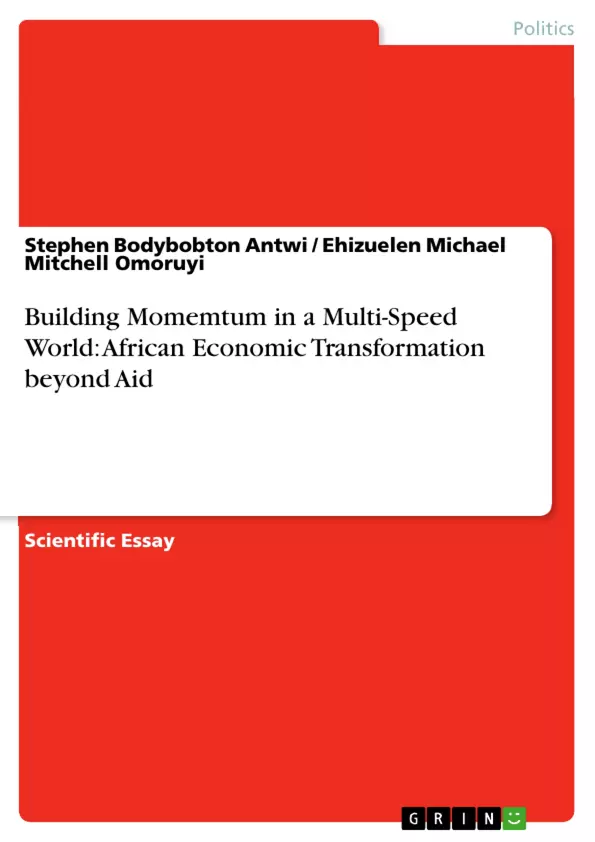This article examines the multiple economic and social problems Africa is facing, and concludes that the continent transformation rests not on ‘aid’ but momentum for ‘wealth creation’ which can be look at from these key pillars: entrepreneurship, knowledge, governance and technology. Africa needs to think outside the box when establishing and utilizing these pillars. However, to make these pillars work, mindset transformation is a precondition. Africa has to start having bigger ‘mental picture’, reflecting long-termist, rather than short-termist attitudes. The continent has to move from begging to borrowing and restructure its communities to push the perception of networks beyond closed ethnic networks. The continent also needs to include fresh actors in its development plans; for example, Africans in the Diaspora and the new-breed business class. Immigrant entrepreneurs in Africa, especially Asians, must be encouraged and supported to channel their investments towards the vital sectors. Better leadership and governance system would be established if the people are viewed as citizens and not subjects. In the same way, leaders in Africa should perceive infrastructure as the foundation of a successful economy. The success of Africa’s active involvement in global trade can only be actualized when Africans decide to learn lessons from the jungle, where the active pack is the king.
Inhaltsverzeichnis (Table of Contents)
- Abstract
- Introduction
- The Realization of the New African Image: Building Suitable Entrepreneurship
- Building Africa's Knowledge Base
- Principles of Good Governance in Africa
- Technology Import Vision
- Social Transformation: The Road Choice of the Future
- Conclusion
Zielsetzung und Themenschwerpunkte (Objectives and Key Themes)
This article examines the economic and social challenges facing Africa and argues that the continent's transformation requires a shift from dependence on aid to a focus on wealth creation. This shift is built upon four key pillars: entrepreneurship, knowledge, governance, and technology.- Shifting from aid dependency to wealth creation
- The importance of entrepreneurship in African development
- The role of knowledge and technology in driving economic growth
- The necessity of good governance and effective leadership
- Mindset transformation as a precondition for sustainable development
Zusammenfassung der Kapitel (Chapter Summaries)
- Introduction: This chapter critiques the effectiveness of foreign aid in Africa, arguing that it has failed to significantly improve the continent's economic conditions. It highlights the need for a new approach to development, emphasizing the importance of self-reliance and wealth creation.
- The Realization of the New African Image: Building Suitable Entrepreneurship: This chapter focuses on the crucial role of entrepreneurship in driving Africa's economic development. It emphasizes the need for fostering an entrepreneurial spirit, creating a favorable business environment, and supporting immigrant entrepreneurs.
Schlüsselwörter (Keywords)
The primary focus of this article lies in exploring the economic transformation of Africa, moving beyond the traditional reliance on aid. Key concepts include entrepreneurship, knowledge, governance, technology, and wealth creation. The article also discusses the significance of mindset transformation and the role of both African and immigrant entrepreneurs in driving economic development.Frequently Asked Questions
Why does Africa need to move beyond foreign aid?
The article argues that aid has failed to improve economic conditions and that true transformation lies in internal wealth creation.
What are the four key pillars of Africa's economic transformation?
The transformation rests on entrepreneurship, knowledge, governance, and technology.
What mindset shift is required for African development?
Africa must move from short-termist to long-termist attitudes and shift from "begging to borrowing" while fostering self-reliance.
How can the African Diaspora contribute to growth?
The paper suggests including fresh actors like the Diaspora and the new business class as vital players in development plans.
What is the importance of infrastructure for African leaders?
Infrastructure is viewed as the essential foundation of a successful economy and must be prioritized by governance systems.
- Citar trabajo
- Stephen Bodybobton Antwi (Autor), Ehizuelen Michael Mitchell Omoruyi (Autor), 2013, Building Momemtum in a Multi-Speed World: African Economic Transformation beyond Aid, Múnich, GRIN Verlag, https://www.grin.com/document/232812



